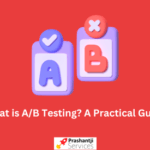Unlocking the Secrets of Search Engine Optimization for Beginners
Are you tired of being buried on the 10th page of Google search results? Do you dream of skyrocketing your website to the top spot? Look no further because we’ve got the secret sauce for Search Engine Optimization (SEO) success! In this beginner’s guide, we’ll uncover all the tips and tricks needed to unlock the power of SEO and get your website noticed by search engines. Get ready to leave your competition in the dust as we dive into Unlocking The Secrets Of Search Engine Optimization For Beginners!
What is SEO?
SEO is short for “Search engine optimization.” It is a long-term marketing strategy employed in order to improve a website’s visibility and organic search results in Google and other global search engines. The goal of SEO is to have your website appear as the top result for relevant keywords when people search for those terms.
The main objective of SEO is to improve the visibility of your website in search engine results pages (SERPs). When your website appears as a top result, it increases the chance that people will click on your link and visit your site. In other words, SEO can help you get more website visitors.
There are two main types of SEO: on-page SEO and off-page SEO. On-page SEO refers to all the measures you can take on your own website to improve your SERP ranking. This includes optimizing your website content, title tags, meta descriptions, header tags, images, etc. Off-page SEO, on the other hand, refers to all the activities that you can do outside of your website to improve your SERP ranking. This includes things like link building, social media engagement, and creating informative blog posts.
To sum it up, SEO is a long-term marketing strategy that helps you improve your visibility in search engine results pages. By optimizing both on-page and off-page elements, you can increase traffic to your website and generate more leads and sales.

How Does SEO Work?
SEO, or search engine optimization, is the practice of improving the ranking of a website on search engines. The higher the ranking, the more likely people are to find the site. There are a number of factors that go into SEO, including the use of keywords and tags, backlinks, and the overall quality of the content.
When it comes to SEO, there is no one-size-fits-all solution. The strategies used will vary depending on the type of website and its purpose. However, there are some basic principles that all website owners can follow to improve their ranking.
One of the most important things to keep in mind is that SEO is a long-term strategy. It takes time and patience to see results. Those who try to take shortcuts by using black hat techniques will likely be penalized by search engines and see their ranking drop significantly.
If you’re just starting out with SEO, it’s important to educate yourself on best practices and stay up-to-date with changes in the algorithms used by search engines. Fortunately, plenty of resources are available online to help you learn more about SEO.
Keyword Research
If you’re new to search engine optimization (SEO), you may be wondering what all the fuss is about. Why bother with keyword research? What difference does it make which words you use to describe your business, product, or service?
As it turns out, quite a lot! The words you use on your website and in your online marketing materials are crucial to how well your site ranks in search engine results pages (SERPs). That’s because the algorithms that power these search engines are designed to match user queries with relevant, high-quality content.
And what’s one of the key factors in determining whether your content is relevant and high-quality? You guessed it: keywords!
Keyword research is the process of finding and selecting the best keywords to target for your SEO efforts. When done properly, it can help you attract more visitors to your site, improve your conversion rate, and boost your bottom line.
So how do you go about conducting keyword research? Here are a few tips:
1. Start with brainstorming.
Make a list of all the words and phrases that come to mind when you think about your business, product, or service. Don’t worry about being too specific at this stage – just get all of your ideas down on paper (or in a digital document).
2. Do some competitor analysis.
Check out what keywords your competitors are targeting. You can use tools like SEMrush or Ahrefs to get an idea of what keywords they’re ranking for and how difficult it is to rank for those terms.
3. Use a keyword research tool.
Once you have a list of potential keywords, use a keyword research tool like Google’s Keyword Planner or Ubersuggest to get search volume data and related keywords. This will help you narrow down your list and hone in on the best options.
4. Analyze search intent.
When evaluating keywords, make sure you consider the intent behind them. Are people searching for information, products, or services? Are they looking for something specific? These factors can help you determine which keywords are more likely to be successful.
Following these tips should help you get started with your keyword research. Good luck!

Technical SEO
Technical SEO is one of the most important, yet often overlooked, aspects of SEO. Technical SEO refers to the optimizing of your website for Google’s search algorithm. It is important to ensure that your website is accessible and crawlable by Google’s bots so that your content can be indexed and ranked in search results.
To optimize your website for Google’s search algorithm, you need to first understand how Google crawls and indexes websites. Google uses bots, also known as web crawlers or spiders, to discover new content on the internet. When a bot discovers a new website, it will crawl the site to index its content. The process of crawling and indexing a website can take weeks or even months.
Once your website is crawled and indexed by Google, it will start to appear in search results. However, your website’s position in search results is not solely based on the quality of your content; it is also based on how well your website is optimized for Google’s search algorithm. This is where technical SEO comes into play.
Technical SEO refers to the optimizing of your website for Google’s search algorithm. There are many factors that go into technical SEO, such as site speed, mobile-friendliness, structured data, etc. All of these factors play a role in how well your website ranks in search results.
One of the most important aspects of technical SEO is site speed. Site speed is
On-Page Optimization
One of the most important aspects of search engine optimization is on page optimization. This is the process of ensuring that your website’s pages are properly structured and formatted so that they can be easily found and indexed by search engines. On page optimization includes things like optimizing your website’s title and meta tags, as well as making sure that your website’s content is keyword-rich and relevant to your target audience.
If you’re new to SEO, then on-page optimization may seem like a daunting task. However, there are plenty of resources available to help you get started, including our very own SEO for Beginners guide. Once you’ve got a handle on on page optimization, you’ll be well on your way to improving your website’s search engine ranking and visibility.
In addition to optimizing your website’s pages, you’ll also want to make sure that your website is mobile-friendly. This means making sure that your website is optimized for different devices and screen sizes so that users can easily access it regardless of what type of device they’re using. Additionally, you’ll want to ensure that your website loads quickly on all devices, as page speed plays an important role in search engine rankings.
Off-Page Optimization
Off-page optimization is the process of optimizing a website for search engines, with the goal of improving the visibility and ranking of the site. The main focus of off-page optimization is on link building, which is the process of acquiring links from other websites. Link building is a complex and time-consuming process, but it is essential for SEO success. There are many different techniques for link building, and new strategies are constantly emerging. The most important thing to remember is that all links are not created equal. Quality matters more than quantity, and links should be acquired from high-quality websites.
Off-page optimization also involves other activities. For example, content marketing and social media promotion can help to increase a website’s visibility. Additionally, off-page optimization includes activities like keyword research and analysis in order to find the best keywords for SEO success. Lastly, off-page optimization includes on-page optimization, such as ensuring that the website is technically sound and optimized for search engine crawling.
Local SEO
Local SEO is one of the most important aspects of search engine optimization for beginners. It is essential to optimize your website for local searches in order to improve your visibility in the search engines. There are a few things that you need to do in order to optimize your website for local searches. First, you need to make sure that your website is listed in the appropriate directories. Second, you need to submit your website to the major search engines. Third, you need to create local listings on the major search engines. Fourth, you need to optimize your website for the specific keywords that people use when they search for businesses in your area.

Link Building Strategies
In order to improve your website’s ranking on search engines, you’ll need to engage in link building. This simply means creating links on other websites that lead back to your own. Link building is a complex and time-consuming process, but it’s essential if you want your website to be successful.
There are a number of different link-building strategies you can use, and the best approach for you will depend on your particular industry and goals. However, some general tips for effective link-building include:
1. Creating high-quality content that others will want to link to.
2. Reaching out to other websites and bloggers in your industry to ask for links.
3. Creating helpful resources such as infographics or blog posts that others can link to.
4. Getting involved in online communities and forums related to your industry.
5. Submitting your website to relevant online directories and listings
Analytics and Measurement
The heart of any good SEO strategy is analytics and measurement. Without data, it’s impossible to know which tactics are working and which need to be tweaked (or abandoned altogether). The good news is, there are plenty of free tools out there that can help you get the data you need.
Here are a few of our favorite tools for tracking SEO progress:
- Google Analytics: This should be your go-to tool for all things web analytics. Google Analytics is free to use and gives you a ton of data on your website visitors, including where they come from, what they do on your site, and how likely they are to convert into a lead or customer.
- Bing Webmaster Tools: If you want to track your SEO progress on Bing (which you should), Bing Webmaster Tools is the way to go. It’s free to use and provides valuable insights into how your site is performing on Microsoft’s search engine.
- KWFinder: KWFinder is a great tool for keyword research. With it, you can find long-tail keywords that you can rank for easily. Best of all, it’s only $29/month for unlimited searches.

Conclusion
Search Engine Optimization can seem like a daunting task for beginners, but with the right approach and knowledge, anyone can learn how to optimize their website. By understanding the basics of SEO – such as keywording and content optimization – websites will be better equipped to rank higher in Google searches. Additionally, developing links on other sites and utilizing social media platforms are just some of the ways to increase visibility online. With these tips in mind, you’ll be well on your way toward mastering the art of search engine optimization.








